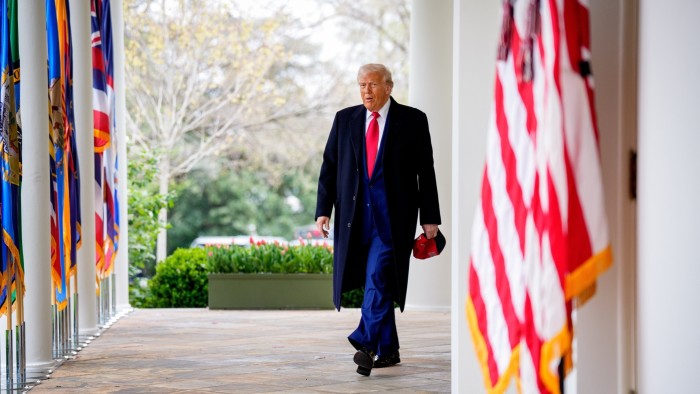Unlock the White House Watch newsletter for free
Your guide to what the 2024 US election means for Washington and the world
Donald Trump once said that tariff was the most beautiful word. After the markets closed on Wednesday, he declared “liberation day” in its honour. To America’s trading partners, April 2 will mark the end of a global trading era. Trump has elevated tariffs to rates last seen after passage of the infamous Smoot-Hawley Act in the Great Depression. To US consumers, liberation day spells higher prices. But to Trump it was fulfilment of a life-long ambition to declare economic war on the foreign “cheaters” and “scavengers” who for decades had “looted”, “raped”, “plundered” and “pillaged” America. Tell us what you really think, Mr President.
The instant effect of “liberation day” will be confusion and uncertainty, which for Trump is often intentional. The more chaos there is, the greater his sense of being in control. Countries will struggle to figure out how Trump’s officials calculated each specific rate, which he said was based on a mix of tariffs, subsidies and currency manipulation. A few, such as Brazil and the UK, got away with the minimum 10 per cent levy. Others, such as Vietnam, Cambodia and Laos, were hit at more than 40 per cent. With the EU at 20 per cent and China at 34 per cent, Trump has on average raised US import prices by at least a quarter. That is before the rest of the world retaliates.
Another impact is transactional. Countries will question Trump’s methodology and plead for lower rates. US companies will also lobby for tariff exemptions on imported components. On both these fronts, Trump will be in his element. Washington’s grift potential has just shot up. Nations and firms that offer concessions and favours in exchange for lower rates or waivers will be rewarded. Those that respond in kind to Trump will be punished. Trump’s record shows that he will escalate US rates in turn. The end state is impossible to predict. Whatever damage the global trade war does to prices, growth and jobs, economic forecasting will boom.
The political impact goes mostly in one direction. In theory, higher inflation and lower growth ought to harm a sitting president. Trump came to office vowing to lower prices — as distinct from reducing inflation — and is now delivering its opposite. Since the inflation backlash propelled Trump’s victory, his deliberate price increases should result in punishment. There were already signs of voter disaffection on Tuesday night when Republican margins were sharply reduced in special elections in safe districts. Trump’s latest Reuters-Ipsos approval rating also dropped sharply this week to just 43 per cent.
But the midterm elections are still 20 months away. It is also rash to assume that voters will be immune to economic disinformation. Social media has taken the art of scapegoating to near scientific heights. The next logical shoe to drop — and another long-standing Trump goal — would be to order far larger-scale deportation of immigrants. To date, Trump has confined his arrests and evictions to propagandistic test cases. The next phase could be to step those up.
Then there is the national security impact on the US. Most of the focus has been on the economic cost of Trump’s “liberation day”. But the geopolitical fallout could be far longer lasting. It is notable that Trump went through a long list of friends and allies before he mentioned China. But the impact will be to push all of them closer together. Last weekend, economic officials from Japan and South Korea met their Chinese counterparts — the first such meeting in years in what was in effect a planning session on how to cope with Trump’s trade war. The EU and Canada are also making overtures to China.
Trump prides himself on being unpredictable. It is plausible that a market backlash, which was evident in the falling futures prices as he started talking, could curtail his most belligerent instincts. But the world is now deeply schooled in Trump’s ability to turn on a dime. Ask Mexico and Canada, which were forced by Trump to renegotiate Nafta in his first term in a deal that he now describes as “terrible”. Irrespective of whether Trump’s trade war chaos is fleeting or gets worse, the diplomatic cost will be enduring. Countries will look to do the serious deals with each other and bypass America. In that sense Trump’s transactionalism is self-defeating. Falling trust means fewer deals.
